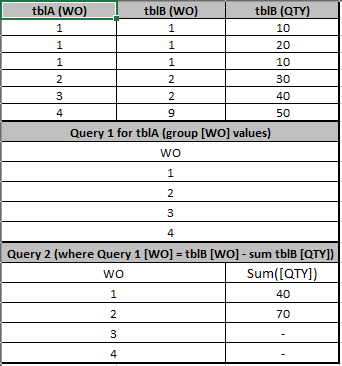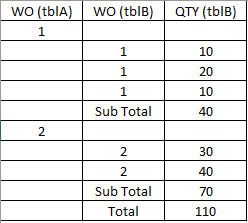Hi. Not sure I understand. How could 1 2 40 and 4 9 50 be matching WOs?
Query/Report Generation
Hello,
I have two tables tblA and tblB that contain a common field called WO. WO is not unique and can have multiple repeats occurrences in each table. In tblB there is also a field (QTY) that I would like to sum based on equal WO values in tblA and tblB. What I was attempting was to generate a Query for tblA that "groups" the WO values. I then thought I would run a 2nd Query using the first Query and tblB (related by the WO value).
tblA - WO values tblB (WO) tblB (QTY)
1 1 10
1 1 20
1 1 10
2 2 30
3 2 40
4 9 50
Query 1
WO
1
2
3
4
Query 2
WO QTY
1 40
2 70
3 -
4 -
Is this the appropriate method? I am not receiving QTY values in the 2nd Query.
Thanks
5 answers
Sort by: Most helpful
-
-
Natiq Rzazade 1 Reputation point
2021-05-27T12:35:00.983+00:00 Do you need sql query for this or I can't right understand?
-
 DBG 2,301 Reputation points
DBG 2,301 Reputation points2021-05-27T14:30:12.5+00:00 Can you also show us the final result you expect to get? Thanks.
-
 DBG 2,301 Reputation points
DBG 2,301 Reputation points2021-05-27T16:06:44.467+00:00 Hi. Thanks for the additional information. So, are you saying you don't need to see WOAs 3 & 4 in the result since they don't have a matching QTY in WOB? How about WOB 9, you don't want it listed in the result either?
-
 DBG 2,301 Reputation points
DBG 2,301 Reputation points2021-05-27T17:50:17.803+00:00 Alright, I think I fully understand now. If you're using SQL Server, you can use a FULL OUTER JOIN to get that result. But, if you're using Access, then you'll have to use a UNION query.
For example:
SELECT T1.WO AS A, T2.WO AS B, Sum(T2.QTY) AS Total FROM (SELECT DISTINCT TableA.WO FROM TableA) AS T1 LEFT JOIN TableB AS T2 ON T1.WO=T2.WO GROUP BY T1.WO, T2.WO UNION SELECT Null, T3.WO, Sum(T3.QTY) FROM TableB AS T3 WHERE T3.WO NOT IN (SELECT DISTINCT TableA.WO FROM TableA) GROUP BY T3.WO ORDER BY 1, 2(untested)
Hope that helps...

